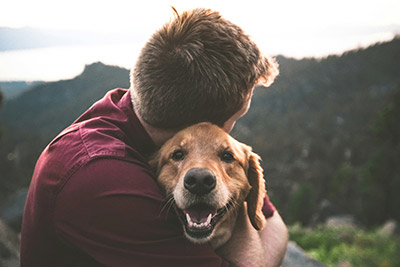In the realm of mental health, where the complexities of emotions intertwine with the challenges of daily life, an unlikely hero emerges – our beloved pets. The bond between humans and animals has been a source of comfort and solace for centuries. In recent times, the profound impact of pets on mental well-being, specifically in providing emotional support for depression, has come to the forefront. This article explores the multifaceted relationship between depression and pets, delving into the realm of pet support for depression and uncovering the therapeutic benefits of animal companionship.
Explore the Link between Depression and Pets
 Depression, a pervasive mental health issue affecting millions worldwide, often creates a sense of isolation and despair. Amidst this darkness, pets illuminate a path of hope. The connection between depression and pets is more than a mere coincidence; it is rooted in the biological and psychological facets of human nature. As we explore this connection, we unravel the science behind how our furry friends become beacons of emotional support for those grappling with depression. Beyond the immediate comfort they provide, the unconditional love and non-judgmental companionship offered by pets activate positive neurotransmitters, fostering a sense of well-being. In moments of emotional turmoil, the simple act of petting a dog or cat can release oxytocin, known as the “love hormone,” offering a tangible source of solace. This symbiotic relationship extends beyond mere companionship, showcasing the profound impact pets can have on our mental health.
Depression, a pervasive mental health issue affecting millions worldwide, often creates a sense of isolation and despair. Amidst this darkness, pets illuminate a path of hope. The connection between depression and pets is more than a mere coincidence; it is rooted in the biological and psychological facets of human nature. As we explore this connection, we unravel the science behind how our furry friends become beacons of emotional support for those grappling with depression. Beyond the immediate comfort they provide, the unconditional love and non-judgmental companionship offered by pets activate positive neurotransmitters, fostering a sense of well-being. In moments of emotional turmoil, the simple act of petting a dog or cat can release oxytocin, known as the “love hormone,” offering a tangible source of solace. This symbiotic relationship extends beyond mere companionship, showcasing the profound impact pets can have on our mental health.
How do Pets Influence Mental Health?
Delving into the intricate dance of neurochemicals within our brains, we uncover the physiological changes that occur when we interact with our pets. The release of oxytocin, the “love hormone,” and serotonin, the mood stabilizer, is significantly heightened during these interactions. Understanding this neurochemical interplay provides insight into why pet support for depression is more than just a comforting notion—it’s a tangible and measurable reality. Additionally, the increased production of dopamine, the pleasure neurotransmitter, amplifies the positive emotional experience, contributing to an overall improvement in mood and mental well-being. This intricate web of neurochemical responses solidifies the therapeutic role that pets play in alleviating the symptoms of depression, offering a holistic and scientifically grounded approach to mental health support.
The Role of Pets as Silent Companions in Mental Health Journeys
 In the throes of depression, verbalizing emotions can be an overwhelming task. Enter our furry companions, the silent healers who require no words to understand our pain. Examining the therapeutic bond between humans and animals, we explore how the unconditional love and non-judgmental presence of pets create a safe space for individuals navigating the tumultuous waters of mental health. Furthermore, the intuitive nature of pets allows them to sense changes in their owner’s emotional state, offering an empathetic connection that transcends the need for verbal communication. Their silent companionship becomes a powerful antidote, providing solace and understanding in moments when words fail to convey the depth of one’s emotional struggles.
In the throes of depression, verbalizing emotions can be an overwhelming task. Enter our furry companions, the silent healers who require no words to understand our pain. Examining the therapeutic bond between humans and animals, we explore how the unconditional love and non-judgmental presence of pets create a safe space for individuals navigating the tumultuous waters of mental health. Furthermore, the intuitive nature of pets allows them to sense changes in their owner’s emotional state, offering an empathetic connection that transcends the need for verbal communication. Their silent companionship becomes a powerful antidote, providing solace and understanding in moments when words fail to convey the depth of one’s emotional struggles.
Benefits of Animal Therapy
Animal therapy, a growing field in mental health treatment, harnesses the innate healing abilities of pets. From traditional therapy animals to emotional support animals, we unpack the various roles these creatures play in alleviating the symptoms of depression. Whether through structured interventions or the simple joy of a wagging tail, the benefits of animal therapy extend far beyond the surface, leaving a lasting impact on mental well-being. Additionally, the non-judgmental companionship provided by therapy animals fosters a sense of security and trust, creating an environment where individuals feel comfortable expressing their emotions without fear of judgment. The evolving landscape of animal therapy continues to demonstrate the profound and multifaceted ways in which our furry friends contribute to mental health and emotional resilience.
How do Pets Contribute to Coping Strategies?
Depression often demands a holistic approach to recovery, encompassing coping strategies that nurture mental resilience. Pets, with their consistent presence and unwavering support, become integral components of these coping mechanisms. We explore how the daily routines, responsibilities, and companionship offered by pets contribute to building a resilient foundation for individuals combating the challenges of depression. Furthermore, the sense of purpose derived from caring for a pet instills a routine that encourages stability, providing a framework for individuals to navigate the ups and downs of their mental health journey. This symbiotic relationship with pets not only fosters emotional well-being but also empowers individuals with a tangible source of motivation to engage in activities that promote a sense of accomplishment and joy.
Breaking Stigmas and Fostering Understanding
 In a society where mental health stigmas persist, the role of pets in providing emotional support for depression is a beacon of change. This section sheds light on how acknowledging and embracing the healing power of pets can contribute to breaking down stigmas surrounding mental health. By fostering understanding and acceptance, we pave the way for a future where the therapeutic benefits of the human-animal bond are recognized and integrated into mainstream mental health discourse. Moreover, the visible impact of pet companionship on individuals’ well-being serves as a powerful testimony, challenging misconceptions and encouraging open conversations about mental health, ultimately fostering a more compassionate and informed society.
In a society where mental health stigmas persist, the role of pets in providing emotional support for depression is a beacon of change. This section sheds light on how acknowledging and embracing the healing power of pets can contribute to breaking down stigmas surrounding mental health. By fostering understanding and acceptance, we pave the way for a future where the therapeutic benefits of the human-animal bond are recognized and integrated into mainstream mental health discourse. Moreover, the visible impact of pet companionship on individuals’ well-being serves as a powerful testimony, challenging misconceptions and encouraging open conversations about mental health, ultimately fostering a more compassionate and informed society.
Seeking Professional Help?
Take the first step towards healing. If you’re struggling with depression or other mental health challenges, reach out to us for professional support and guidance. You don’t have to face it alone – contact us today.
Conclusion
In the tapestry of mental health, where threads of despair and hope intertwine, pets emerge as steadfast companions, weaving a narrative of emotional support for depression. The link between depression and pets is not merely anecdotal; it is a scientifically backed testament to the transformative power of the human-animal bond. As we navigate the complexities of mental health, let us recognize and celebrate the invaluable role our furry friends play in fostering emotional well-being and, in doing so, contribute to a more compassionate and understanding society.
















